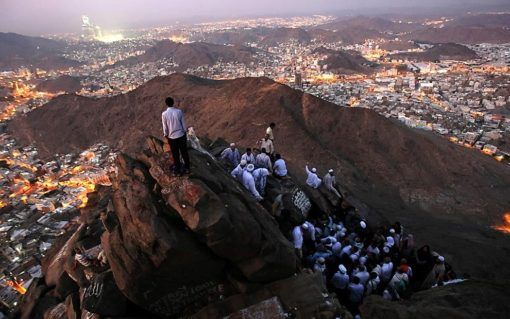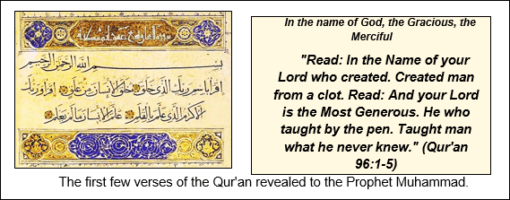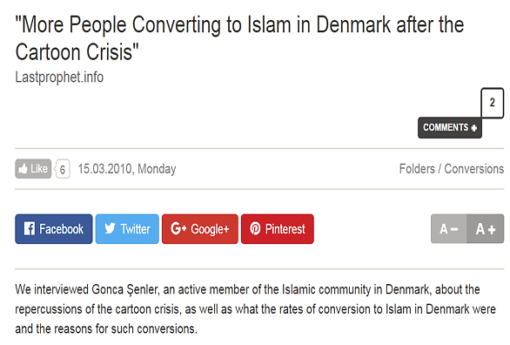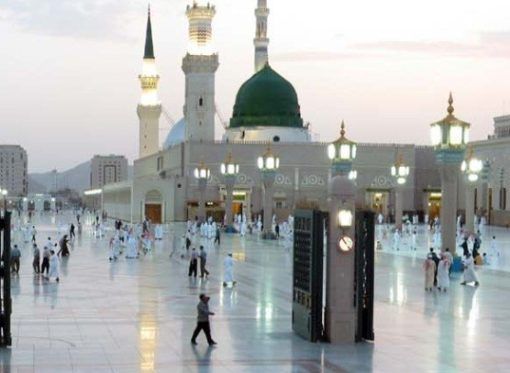
PROPHET MUHAMMAD, THE MOST INFLUENTIAL PERSON IN HISTORY(PEACE BE UPON HIM)
Dr Muhammad Solaiman
The Prophet Muhammad (peace be upon him, PBUH) is the final prophet of God. Like all other prophets, his mission was to preach One God and to emphasize His obedience. The Qur’an revealed to him has been well-preserved.
The Prophet Muhammad (PBUH) lived in the full light of history, because, his followers well-preserved the full details of his life and teachings. Muslims believe that Muhammad was a man chosen by God and not, in any way, divine.
Before revelation
He was born in 570 CE in an illiterate society in the city of Makka in the Arabian Peninsula. His father died before his birth and his mother died when he was six years old. His grandfather, who was a respected man in the tribe of Quraysh, became his guardian. At the age of eight, his grandfather died and his uncle became his guardian.
He was a shepherd when he was young, and after adulthood, he joined his uncle in his trading business to Syria. In his youth and adult life, he was famous for his fidelity, integrity and trustworthiness. Therefore, he earned the nickname the trustworthy (Al-Ameen).
When he was twenty-five years old, a widow named Khadija hired him to take her merchandise to Syria. The Prophet Muhammad (PBUH) then married Khadija, who was older than him. They lived together for almost a quarter of a century and she gave birth to all his children, except one.
The revelation of the Qur’an
The Prophet Muhammad (PBUH) used to go for contemplation in an isolated cave called ‘Hira’. It is located on one of the mountains near Mecca. In 610 CE, when the Prophet Muhammad was forty, he received the first revelation of the Qur’an through Angel Gabriel. The revelation continued for twenty-two years until his death in 632 CE. Therefore, the Prophet Muhammad had the chance to translate God’s revelation into practices.
The hostility of Pagans
For two to three years the Prophet preached Islam secretly to trusted people. After which, he started publicly calling to Islam. People who embraced Islam faced an increasing hostility from the idol worshipers of Makka. In spite of the protection of his uncle, Muslims suffered from harassment, abuse, persecution and torture. Therefore, some of the Muslims had to migrate to Abyssinia.

The cave of Hira on the top of the mount of Al-Noor, near Makka, where the first verses of the Qur’an were revealed.

The disbelievers then imposed economic and social sanctions on the Prophet and his followers. This still did not affect the determination of Muslims to keep and propagate their faith. After the death of his wife Khadija and his uncle Abu Talib, the situation became worse. The Makkan period lasted thirteen years and only about 200 people converted.
Migration to Madina
In 622 CE, a breakthrough came when during the pilgrimage season, six people from Yathrib, a city about 450 km to the north of Makka, accepted Islam. A year later, seventy-three people became Muslim and promised to protect the Prophet Muhammad and his followers.
So, the Prophet Muhammad instructed his followers to emigrate in small groups to Yathrib. All Muslims migrated from Makka to Yathrib in small groups. One night when Qurayshi disbelievers besieged Muhammad’s house to kill him. He escaped and migrated to the city of Yathrib, which was then called Madina.
The Emigrants of Makka left almost everything behind and went to Medina empty-handed. However, the Prophet Muhammad (PBUH) made a formal bond of fraternity among them. Therefore, the immigrants were cordially welcomed and helped by the Muslims of Medina.
The new Muslim society in Madina
In order to establish peaceful coexistence among the heterogeneous population of Madina, the Prophet Muhammad invited the leading personalities of all the communities to reach a formal agreement that provided harmony among the communities and security of the city of Medina.
Fights between the Makkans and the believers
Three major battles were fought between Makkans and the believers of Medina. The Muslims won the first and lost the second battle. In the third battle, Medina was besieged by a coalition of the Makkans and Arabian tribes. The Prophet and his followers successfully defended Madina.
Eventually, a ten-year treaty of Hudaybiyah was signed between Makka and Medina in 628. At that time, Muslims numbered about three thousand. This treaty was a turning point for Muslims. In the peaceful atmosphere, many non-Muslims willingly converted to Islam.
When Makka broke the treaty, the Muslim army conquered Makka in 630 CE without any resistance. Mass conversions followed the conquest, though nobody was forced into the religion of Islam.
At the Farewell Pilgrimage, the Prophet Muhammad (PBUH) gave a speech to about 130,000 people. His speech is considered the first Human Rights declaration in history.
By the time of the death of the Prophet Muhammad, in 632 CE, Islam was well-established as the religion of the Arabian Peninsula and made inroads in neighboring regions.
The core of his life
The love of God was at the centre of the life of the Prophet Muhammad (PBUH). He saw the majesty of his Lord, and therefore, he never stopped praising Him.
The continuous communion between the Prophet Muhammad (PBUH) and God was the core of his life. He started his day and ended it with extolling God’s praises. The five obligatory prayers (Salat) were the most profound worship in his life. They were spiritual stations that comforted him and renewed and enhanced his strength. He used to say to Bilal, who used to give the call for the prays (the Azan), “Bilal, give us the comfort of prayer.”
He also used to pray in a privacy at home, in the depth of the night throughout his life. This devotion and love of God are one of the proofs of his prophethood which could have never been made by an impostor.
The unique example
Muhammad (PBUH) lived a humble life in the service of God and he exemplified Islam as a way of life. He showed us, what it means to be an ideal leader, friend, husband, teacher, ruler, warrior, judge, etc. Although the mission of the prophet Muhammad (PBUH) started in an illiterate society, after a few hundreds of years, Islam spread from Spain to China.
The wealth of the teachings, instructions, admonitions and guidance of the Prophet Muhammad (PBUH), in all aspects of life, are well recorded. They were collected from those who were in direct contact with him. There are no dark corners missing in his life; everything is clear and transparent. We know about him more than we know about our own fathers.
The Prophet Muhammad (PBUH) taught Muslims decency, integrity, sensitivity, self-restraint, patience, forgiveness and respect for one another. He taught his followers to do their work perfectly until the last moment of life. Also, he taught Muslims to love others as they love themselves. He taught us humility, nobility, purity, decency, austerity, refinement and devotion.
“None of you will believe until he loves for his brother what he loves for himself” (Narrated by Bukhari).
The most beloved person in the history
No man ever in history has been so beloved and followed in all aspects of his life like Muhammad (PBUH). More than 1.6 billion Muslims, from all the globe love, adore and follow the Prophet Muhammad. He is present in their thoughts and alive in their hearts.
Michael H. Hart the author of “The 100: A Ranking of the Most Influential Persons in History” stated:
“My choice of Muhammad to lead the list of the world’s most influential persons may surprise some readers and may be questioned by others, but he was the only man in history who was supremely successful on both the religious and secular levels.”
” It is this unparalleled combination of secular and religious influence which I feel entitles Muhammad to be considered the most influential single figure in human history.”
From hate to love
Those who attack the Prophet Muhammad do not know of him. After knowing him, those who hated him loved, respected and followed him. Let’s read this short story about one of the Muslim’s captives.
To this captive, the Prophet was the person he hated most. The Prophet ordered him to be tied to a post in the mosque. The captive watched the Prophet and how he treated his followers. After a couple of days, the Prophet (PBUH) released him and the captive simply went away, took a bath and came back. He sat in front of the Prophet and said:
“I bear witness that there is no deity other than God and that Muhammad is God’s messenger. By God, there was no face on earth I hated more than your face. Now your face is the one I love most. There was no religion, I hated more than your religion. Now your religion is the one I love most. There was no town I hated more than your town. Now it is the one I love the most.”
A similar recent example is demonstrated in the story of Arnoud van Doom. He was a former far-right politician of the Dutch Freedom Party. This party is known for its stiff hostility towards Islam and the Prophet Mohammad (PBUH).
In 2008, Arnoud contributed in the production of “Fitna,” which is a Dutch anti-prophet Muhammad film. Arnoud then had to learn more about Islam and the Prophet Muhammad, to produce another anti-Islam film. But, he was inspired by Islam and he became a Muslim in December 2012. His eldest son experienced the marvelous effect of Islam on his father, he too converted to Islam, in 2014.

The attacks of some Western media on Islam has led to an increase in the number of converts to Islam.

Arnoud van Doom the distributor of anti-Islam film “Fitna” holding the Qur’an after his conversion to Islam.
Don’t be dragged into violence
Some Muslims are dragged to revenge for the Prophet through violence. Unfortunately, they do not realize that by doing so, they both harm innocent people and offend Islam and Muslims. Violence contradicts the core of the prophet’s message and its spirit. The best way to translate our love to the Prophet Muhammad (PBUH) is by following his teachings. This would show the beauty of Islam and demonstrate to the whole world how the Prophet Muhammad, is a mercy to the whole world.
“And We have sent you (O Muhammad) as a mercy for the Worlds” (Qur’an, 21:107).

The mosque of the Prophet Muhammad (PBUH) in Madina city, Saudi Arabia, where the prophet was buried.
Related links
- Muhammad a blessing for mankind
- The life of the prophet Muhammad
- A day in the life of Muhammad
- The characteristics of prophet Muhammad
- The 100: A Ranking of the Most Influential Persons in History file:///C:/Users/Dr-Mohamed/Downloads/_OceanofPDF.com_The_100_A_Ranking_Of_The_Most_-_Michael_H_Hart%20(1).pdf
- Arnold, https://www.youtube.com/watch?v=AoiqYTvwEhc, https://www.youtube.com/watch?v=-vpilPcMsUg

